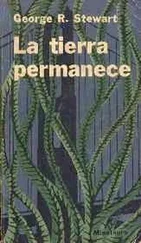“The old clock’s going to pieces at last,” he thought. “Not surprising!” He remembered how the motion of its hands had startled him when he had first returned to the house.
He sat down to read again. A high wind from the north with the heavy smell of smoke in it blew so hard that it rattled the windows occasionally. By now he was used to the smell of smoke, and did not think about it. At many times he could not even get a good view because of the smoke of the burning forests. After a while he blinked his eyes a little, and stared more intently at the page where the letters seemed to have grown strangely indistinct. “This smoke must be making my eyes water,” he thought. “I don’t seem to see so well.” But as he looked closer, it seemed that not only the page before him but the whole room had grown dimmer. With a sudden start he looked at the electric-light bulb in the bridge lamp beside him.
Then quickly, with a jumping heart, he was out of his chair and standing on the front porch looking out over the broad stretches of the city below him. The lights were still burning along the streets. The chains of yellow beads still showed on the great bridge, and at the tops of the towers the red lights were flashing. He looked more carefully. The lights seemed a little dimmer than they should be, but he could be imagining that, or they might be obscured by all the drifting smoke. He went back and sat in his chair again and tried to read, forgetting about it—forgetting what he feared.
But he blinked—and again! Looking at the light beside him, he was puzzled. Then suddenly he remembered the clock! “Well,” he thought, “it had to come!”
His watch now showed ten-fifty-two. He went out to the kitchen, and saw that the clock was at ten-fourteen. He calculated apprehensively. The result was bad. As closely as he could remember, the clock had lost six minutes in about three quarters of an hour.
The clock was run, he knew, by electrical impulses which were ordinarily timed at sixty to the minute. Now they must be coming less often. An electrical engineer would doubtless have found it an elementary matter to calculate just how much less often. Ish could even have made an attempt at the calculation himself, but he saw no use in it, and he felt suddenly downcast. In any case, once the Power-and-Light system had started to go to pieces, the rate of decline would undoubtedly be progressively faster.
Back in the living-room, he could scarcely doubt now that the light had faded still more. Deep shadows seemed to have moved out from behind the chairs in the corners of the room.
“The lights are going out. The lights of the world!” he thought, and he felt like a child going alone into the dark. Princess lay dozing on the floor. The fading of the lights could mean nothing to her, but she sensed his nervousness and came up restlessly sniffing, whining a little.
He stood on the porch again. Minute by minute the long chain of street-lights grew less and less luminous, more and more yellow. The high wind, he thought, must be helping, blowing down a power-line here, weakening a switch connection there. The fire too was sweeping across the forested ridges unchecked by men, burning power-lines, perhaps, even power-houses.
After a while the lights seemed to fade no further, but to remain at a constant dimness. He went in again, and pulling another bridge-lamp to the side of his chair, he was able to read comfortably with two lights instead of one. Princess lay down again to doze. By now it was late, but he did not want to go to sleep. He felt as if he were sitting up by the deathbed of his most treasured and oldest friend. He remembered those great words “Let there be light, and there was light!” This seemed the other end of that story.
After a while he went to look at the clock again, and saw that it had stopped with the hands symmetrically upward—at eleven-five.
His watch showed him that by now it was well after midnight. The lights might still continue many hours, or even might burn dimly for days. Yet he did not want to go to bed.
He tried to read again, but finally slipped off to sleep in the easy-chair where he was sitting.
With Power-and-Light it was all so carefully contrived that even in the disaster there was no need for adjustment. The men fell sick, but the generators still sent out along the wires their finely timed pulsations. So, when the brief agony of mankind was ended, the lights still burned.
So it continued through the weeks. If a wire broke and cut out a whole town from the flow of power, the system adjusted before that wire had time to fall to the ground. If a power-house failed, just as quickly the other power-houses in the system stretching across hundreds of miles took up the stack, and sent out more power to fulfill the need.
Yet in any system, as in a chain or a road, there is always a weakest link. (That is the fatal flaw of all systems.) The water would continue to flow; the great generators could spin upon their oil-bathed bearings for years. But the flaw lay in the governors which controlled the generators. No one had ever bothered to make them wholly automatic. Once every ten days they were inspected for oil; once a month, perhaps, there was need to add oil to them. After two months without care the oil supplies grew low, and one by one, as the weeks passed, the governors began to go out of action. When one failed, automatically the great water-nozzle changed angle and the water flowed through without touching the wheel. Then the generator ceased revolving, and sent out no more power. As generator after generator was thus cut out of the system, the strain upon the few remaining ones became greater and greater and the decline of the system became cumulative.
When he awoke, he noticed that the lights had faded still more. The filaments in the electric lamps were only an orange-red now. He could look at them without hurting his eyes. Now, although he had not turned off any of the lamps, the room was in half-darkness.
“The lights are going out! The lights are going out!” How often, in how many centuries had those words been said sometimes in matter-of-fact tones, sometimes in panic—now literally, now as symbol? How much light had meant in all the story of Man! Light of the world! Light of life! Light of knowledge!
A deep shiver shook him, but he stilled his panic. After all, he thought, the great system of Power-and-Light had held up for an amazingly long time, all its automatic processes functioning though the men were gone. He thought clear back to that first day when he had come down out of the mountains not yet even knowing what had happened. Then he had passed the power-house, and felt the reassurance that everything must be normal because he saw the water pouring out from the tailraces and heard the dim continuous hum of the generators. He felt again a curious touch of local pride in thinking of it. Perhaps no system had lasted so long. These might well be the last electric lights to be left burning in the world, and when they faded, the lights would be out for a long, long time.
No longer sleepy, he sat there, feeling that he should not go to sleep, wishing at least that the end would come quickly and with dignity and not be dragged out too long. Again, he felt the light fading, and he thought, “This is the end!” But still it lingered, the filaments now only a cherry-red.
And then again they faded. As a sled on a hillside, slowly first, then gaining momentum. Just for a moment, he thought (or imagined), they flared more brightly—and then they were gone.
Princess stirred in her sleep, then suddenly barked the halfbark of a dream. Was it a death knell?
He went outside. “Perhaps,” he thought, “that was just the failure of some local line.” But he was really sure that it had not been. He peered through the darkness, all the thicker for the smoke that was heavy in the air, changing the moon into an orange ball. He could see no light—not along the streets, nor anywhere on the bridge. This, then, was the end. “Let there be no light, and there was no light! ”
Читать дальше












